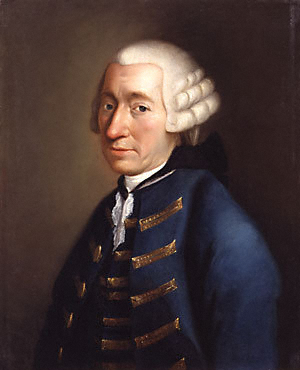
Smollett is typical of the Scotsmen who in the eighteenth century sought fame and fortune in England because only there was prosperity to be found.
Like Fielding, he came of a good family that could afford him little except a sound education. Then, having been apprenticed to a surgeon, he came to London in the hope of becoming a dramatist; having failed to interest anyone, he solicited a surgeon's commission in the Royal Navy, and went on the ill-fated West Indian expedition of 1740, of which the early chapters of Roderick Random give a vivid account.
When he returned to London, he set up as a doctor whose interest in literature was limited to occasional verse satires. Yet, after only eight months of interrupted work, he produced Roderick Random, and its immediate success set him up as a literary figure, a rival to Fielding who heartily detested him for obvious reasons. Smollett was interested only in telling a story, without regard for any lesson it might teach or for even the fairly lax conventions of the eighteenth century; indeed, his hero, a man of 'modest merit struggling with every difficulty', was an unprincipled scoundrel. Moreover, Smollett was convinced that Fielding had shamelessly plagiarized his work for Tom Jones, and Fielding could well have regarded the other as a pusher, a self-seeker no whit better than Roderick.
Smollett utilized the older, shapeless form of story telling; the hero wandered across the country, encountering all manner of misadventures 'intended as a satire upon mankind'. Each chapter was more or less complete in itself, and the humour neither subtle nor refined. Smollett was always attracted by oddities of speech and eccentricities of action, by farcical situations, loud noises and violent movement. So intent was he on bustle that he had little time for people, and therefore he wrote of stock humorous types, caricatures and grotesques, all usually expressive of spite, envy, conceit, opportunism, all the mean vices, the likes of which are found in the earlier novels of Dickens, his enthusiastic admirer.
The sailors in Roderick Random had been the most life-like and attractive of all the huge cast, and in Smollett's next novel, Peregrine Pickle, he created a sailor equally successful but much more developed as a human being—Commodore Trunnion. The second novel was very much like its predecessor except that it had some coherence and a good deal more genuine fun when it dealt with Mr. Pickle, Peregrine's father, and the occupants of the Garrison. Though still largely caricatures, they were described in detail and possessed a spritely interest in life which communicated itself to the reader. For sheer boisterousness, the Commodore and his friends have few to equal them; as for Peregrine, he is a worse creature than even Roderick Random.
After those two popular novels, Smollett gave up his medical career; he settled down to earn a living as an author prepared to try his hand at any form of literature —histories, political magazines, translations, travel books.
In everything he did he was hasty, prone to anger, highly prejudiced, puffed with his own importance. So rancorous did his critical sense become that when he modelled a later work on the style of Gulliver's Travels, he went farther than even Swift in his fierce disgust of British politics.
Then, like Fielding, his health broke down because of overwork, lack of sufficient money to suit his way of life, and chronic mental disturbances. He, too, sought relaxation and rehabilitation in the south of Europe, and produced a very fine travel book as the result of his experiences. But he was too late to save himself; again like Fielding, he died and was buried abroad.